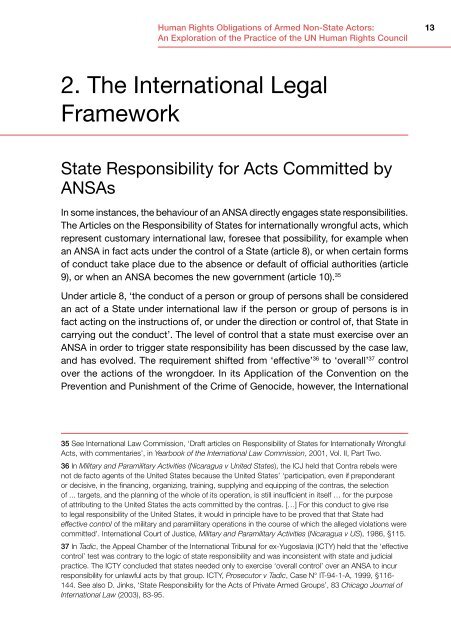InBrief7_web
InBrief7_web
InBrief7_web
You also want an ePaper? Increase the reach of your titles
YUMPU automatically turns print PDFs into web optimized ePapers that Google loves.
Human Rights Obligations of Armed Non-State Actors:<br />
An Exploration of the Practice of the UN Human Rights Council<br />
13<br />
2. The International Legal<br />
Framework<br />
State Responsibility for Acts Committed by<br />
ANSAs<br />
In some instances, the behaviour of an ANSA directly engages state responsibilities.<br />
The Articles on the Responsibility of States for internationally wrongful acts, which<br />
represent customary international law, foresee that possibility, for example when<br />
an ANSA in fact acts under the control of a State (article 8), or when certain forms<br />
of conduct take place due to the absence or default of official authorities (article<br />
9), or when an ANSA becomes the new government (article 10). 35<br />
Under article 8, ‘the conduct of a person or group of persons shall be considered<br />
an act of a State under international law if the person or group of persons is in<br />
fact acting on the instructions of, or under the direction or control of, that State in<br />
carrying out the conduct’. The level of control that a state must exercise over an<br />
ANSA in order to trigger state responsibility has been discussed by the case law,<br />
and has evolved. The requirement shifted from ‘effective’ 36 to ‘overall’ 37 control<br />
over the actions of the wrongdoer. In its Application of the Convention on the<br />
Prevention and Punishment of the Crime of Genocide, however, the International<br />
35 See International Law Commission, ‘Draft articles on Responsibility of States for Internationally Wrongful<br />
Acts, with commentaries’, in Yearbook of the International Law Commission, 2001, Vol. II, Part Two.<br />
36 In Military and Paramilitary Activities (Nicaragua v United States), the ICJ held that Contra rebels were<br />
not de facto agents of the United States because the United States’ ‘participation, even if preponderant<br />
or decisive, in the financing, organizing, training, supplying and equipping of the contras, the selection<br />
of ... targets, and the planning of the whole of its operation, is still insufficient in itself … for the purpose<br />
of attributing to the United States the acts committed by the contras. […] For this conduct to give rise<br />
to legal responsibility of the United States, it would in principle have to be proved that that State had<br />
effective control of the military and paramilitary operations in the course of which the alleged violations were<br />
committed’. International Court of Justice, Military and Paramilitary Activities (Nicaragua v US), 1986, §115.<br />
37 In Tadic, the Appeal Chamber of the International Tribunal for ex-Yugoslavia (ICTY) held that the ‘effective<br />
control’ test was contrary to the logic of state responsibility and was inconsistent with state and judicial<br />
practice. The ICTY concluded that states needed only to exercise ‘overall control’ over an ANSA to incur<br />
responsibility for unlawful acts by that group. ICTY, Prosecutor v Tadic, Case N° IT-94-1-A, 1999, §116-<br />
144. See also D. Jinks, ‘State Responsibility for the Acts of Private Armed Groups’, 83 Chicago Journal of<br />
International Law (2003), 83-95.


